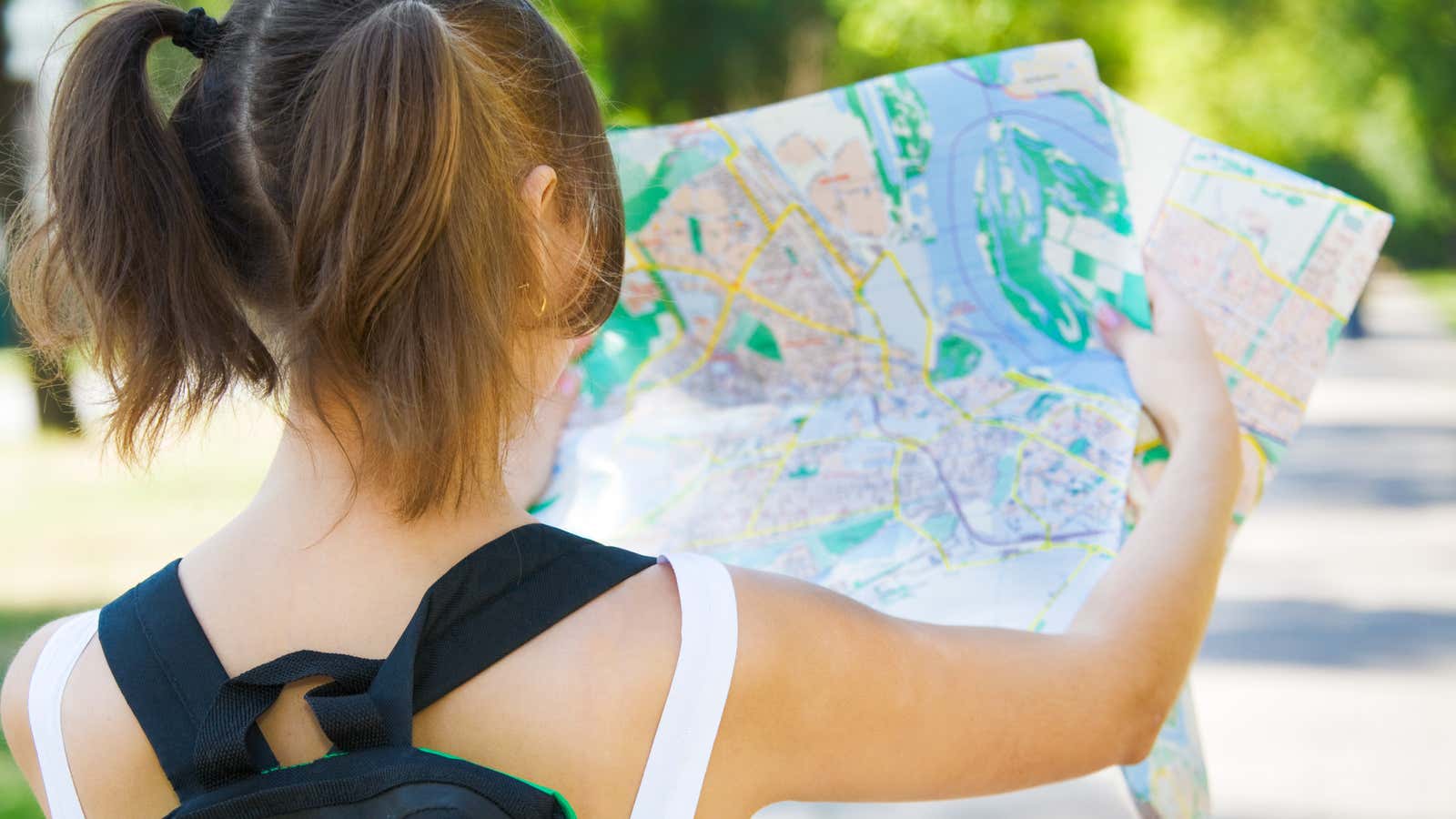Teach Kids to Do Without a Smartphone

One afternoon, as my GPS struggled to load the path to the diner where I was planning to meet my husband for lunch, my son worried that we would never get there. It was a diner we had never been to in the area of a nearby town that I hardly know. “But we can’t get there if the GPS doesn’t load,” my 9-year-old exclaimed.
“What? Of course we can,” I replied.
“But how??”
I listed all the ways: I could call my husband and ask for directions. We could go back inside, start up the computer, look at the directions, and write them down. We could see a map of our area. We could call the diner and ask which way to turn when we get off the freeway. “This technology is really still new,” I told him. “Before, people had to move to new places all the time , and the phone didn’t tell them which way to turn.”
Now that I got his attention, I told him how I was driving around the country at the age of 22 with nothing to guide me other than a really big map and some confidence. This is the version of my generation: walk two miles to school through a blizzard, uphill, in both directions. I assure you he was impressed.
I was reminded of this conversation today when I read an article in the New York Times about an 11-year-old girl who was temporarily “lost” – without a smartphone – in New York and managed to survive. She was supposed to meet the nanny at a nearby Starbucks after swimming class (some wires crossed and the nanny was waiting at another nearby Starbucks).
Michaela Birmingham writes that in the end, her daughter called her from an unknown phone number:
She came. “I’ve been waiting at Starbucks for a long time.” She didn’t see her friend’s nanny, but ordered a drink. The line was long and the barista did not complete the order correctly, so she was not sure if the Starbucks staff could help her much. So she left.
I finally typed in a few words:
“Where are you? Are you all right?” I was suffocating.
“Yes, I’m fine,” she said. “I walked over to a really nice apartment building next to Starbucks and asked the doorman to use the phone.”
This 11-year-old girl is in the present “teenage” stage of her life, that is, too young to have a smartphone (according to her parents), but old enough to have the independence to navigate the world. bit by itself. These are the main years teaching them how to get where they need to, without GPS.
Here are some ways to help your child gain confidence so they can move around without mindlessly following the blue turns on the screen in front of them.
Make them a task to remember where you parked
When you go to Target or a restaurant with a circular parking or a garage in the city center, ask them to remember where you parked and let them guide you back. This will help them develop the habit of observing their surroundings and looking for contextual clues (next to the shopping cart corral or on the second floor, directly opposite the elevators).
Ask them to walk you to your hotel room.
The next time you stay at a hotel and a staff member pulls out this little map to show you where your room is, hand this job over to your child.
Teach them where north, south, east and west are in their city
I try to make it a habit to vocalize which direction we are heading (“Oops, I need to turn around; I go west and I need to go east”) so that my son can start to get his bearings on the way our city is laid out. He should know that the city center is to the south of us, and his school is to the north.
Let them be in charge of the map in the amusement park
Time for lunch? Okay, pick a card, baby. What options do we have? Where are we now and where is the best place to get a slice of pizza?
Ask for directions when they are with you
This is especially great if you are visiting a new or unfamiliar city. Maybe you want to recommend a good restaurant from a local. Let your children witness you asking for directions so that they feel how to explain how to get to the place. And then they can help you remember. “Wait; should we have turned right or left at the stop sign?”
Make sure they remember your phone number
Even if they have a simple, small flip phone for emergencies, you should check periodically to see if they remember your phone number. Flip phones do break or get lost and their batteries die. If they remember your number and cannot understand where they are going, they can always call you and ask. They should also remember their address in case they need to enter it into someone else’s GPS.